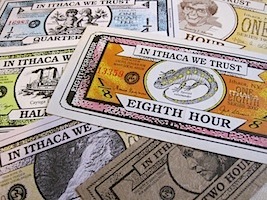




 |
 |
 |
 |
 |
| PAUL GLOVER ESSAYS: community
control of food, fuel, housing, health care,
planning, education, finance. |
| HOME | INTRO | CURRENCY | SUCCESSES | HOW-TO BOOK | PUBLICITY | ESSAYS |
| INSTEAD OF WAR: Localizing while Globalizing with Community Paper Money October 2001 by Paul Glover Successful investing will necessarily become more than the science of maximizing digital wealth by anticipating technological progress and monetary policy. Notwithstanding apparent stock market strength, major investors risk great loss to any extent they rely on extraction of irreplaceable primary materials, and upon police and military to restrain the market's losers. The global market gallops too fast to allow most investors to closely consider the depletion of essential soils, fresh water, minerals and fuels, upon which all commerce depends. Although dysfunctions such as pollution, crime, famine, epidemics and war are profitable for some sectors, they damage longrange market expansion. Prevailing narrow assumptions about profitability would eventually impose hard discipline upon rich and poor alike. But rather than further argue these urgencies, raising alarms about the invasion of externalities, this article describes benefits to the macroeconomy of community paper money, which stimulates real growth while addressing global threats. Its main premise is that the health of the macroeconomy depends ultimately on the vigor of city and village economies, just as healthy lungs depend on tiny air sacs. Replenishment of any market demands capitalization of microenterprise innovation-- many largest corporations started in kitchens or garages. Zero-interest community currency microloans, too small for commercial lenders, can help start or expand promising new small businesses. Simultaneously, new local money opens new local markets for these businesses. The durability of money depends upon commodity backing, and the capacity of real people to buy commodities. There is not enough real production (97.5% of foreign exchange trade is currency futures, etc.) to justify the volume of digital trading driving stocks up. Nor is there any longer enough gold or silver available to provide hard money for the volume of commodity trading needed to sustain six billion humans. The more direct relation between community currency supply and local commodity backing can provide stability to federal dollars. Moreover, supplemental local cash, targeted to small businesses and under/unemployed sectors, enables more local trading to take place, which expands formal business activity and improves creditworthiness. Community currency is a powerful way to bring underutilized labor and talent into local markets, which then feed regional and global trade. Because local currency is money with a boundary around it, the locality gains an infinite multiplier. Yet rather than isolate communities, local cash frees them from the isolation imposed by capital outflows and by low service sector wages, which restrain trade. Local currency enables cities to reach other cities from strength, by maximizing their latent resources to export more and import more. Citizens may even travel more with extra income. Especially importantly, local currency trading reinforces direct face-to-face commerce, as at farmer's markets, where citizens learn about one another as resources, rather than as competitors for scarce dollars. They become friends, lovers and political allies. They make communities while making a living. For these reasons, since 1991, thousands of residents of Ithaca, New York, including 500 businesses (including a bank, movie theaters, health clubs, local farmers and the hospital), have traded several million dollars with their own paper cash, the Ithaca HOUR (One HOUR = one hour of basic labor or $10.00). Dozens of zero-interest HOUR loans have been made. HOUR grants have been given to over 100 local organizations. There are now dozens of HOUR systems in North America (from Brooklyn to Santa Barbara) and worldwide (from China to Argentina) based on this model. |
Ithaca HOURS are backed by thousands of goods and services listed in the local currency directory HOUR Town. Since the correlation between the HOUR supply and commodity backing is direct (food is Ithaca's largest category), we call HOURS real money. HOURS are also backed by labor, a measure of value as steady as the clock. Ithaca's elected HOUR directors (Municipal Reserve Board) carefully monitor circulation to prevent inflation. There is presently generally greater demand for HOURS than supply, so issuance policy has changed to carefully accelerate supply. Currently, there are agreed caps on HOURS outstanding as loans. Fourteen percent of total HOURS issued (plus 25% of HOUR loans repaid) may be issued as community grants. Five percent of HOURS may be issued as grants to the system itself. The remaining HOURS are issued as modest start-up payments to businesses and individuals who provide published backing for HOURS by agreeing to be listed in HOUR Town. The HOUR system funds itself through sales of ads in its directory, by repayment of HOUR loans with dollars, and through grants. Ithacans have even created their own locally-controlled, nonprofit, democratically-managed health security system (Ithaca Health Fund), using local currency. Small businesses otherwise unable to provide health coverage have relied on the Health Fund to improve labor stability. Although chain stores and commercial banks have not yet chosen to accept local cash, they've benefitted already by extra discretionary dollars in the local market. When an HOUR is spent, for food or rent, ten additional dollars are also available to spend. Although it's reasonably assumed that cash trading fosters tax avoidance, and though many people must decide whether to feed their government or their family, overall the economic stimulus provided by HOURS to retailers has increased local sales tax collection. While lower wages are assumed better for business, the higher HOUR minimum wage ($10.00) enables workers to spend who otherwise stay home. At the same time, the HOUR is flexible: professionals may charge multiple HOURS per hour. Yet we note that many professionals charge HOUR users less, in the spirit of the system. More local money among the poor enables more national money to trickle up and down, and reduces the explosive disparity of wealth. And while it's often assumed that we become wealthier the faster we consume resources and throw them away, local currencies enable us readily to expand ecological economic activity. Take for example the assumption that, for construction to thrive, our cities must build taller, consume vast hinterlands, yield to ever-wider highways and ever-more cars, and must spread across forests and farms. As author of the book "Los Angeles: A History of the Future," I've offered a systematic scenario for rebuilding Los Angeles toward balance with nature-- a massive process requiring decades, costing trillions, and producing beautiful, practical and profitable neighborhoods. Replicated worldwide, such urban reconstruction would restart markets afresh. Billions of workers now underemployed would find their creativity engaged. Reliance on unemployment as a tool of labor control would be overridden by realization that idle labor is idle capital, as the world approached universal sufficiency. There is now far more money to be made, for far longer, by replenishing the earth and its cities than by exploiting dysfunctions. Investment in community currency systems brings such choices alive and helps establish the conditions for unlimited growth of a global economy. A planet of such communities, linked by national and supranational currencies which are themselves backed by hundreds of thousands of local currencies (whose integrity is credentialed), will likelier maintain stable, well-fed populations. Such a world could still accommodate singularly wealthy people in beautiful homes, proud of investments that have made everyone's life easier. But they would be less pressured to consume conspicuously. They and their children would enjoy wealth even more fundamental than their bank accounts, and be far more secure from social upheaval.
Economic activity should be fun and beneficial. Who will lead?
Exploring beyond
conventional investment and embracing such new
opportunities may be where really smart money goes. We believe these
opportunities begin with local currency. Paul Glover is founder of Ithaca HOURS and the Ithaca Health Fund, holds degrees in Advertising and in City Management, and founded Citizen Planners of Los Angeles. He is author of Hometown Money. He consults with commmunities about grassroots economic development. (215) 805-8330 [email protected] |